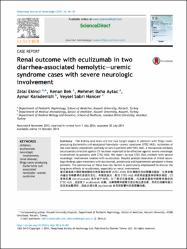Renal outcome with eculizumab in two diarrhea-associated hemolyticeuremic syndrome cases with severe neurologic involvement
Künye
Ekinci Z, Bek K, Aytaç MB, Karadenizli A, Hancer VS. Renal outcome with eculizumab in two diarrhea-associated hemolyticeuremic syndrome cases with severe neurologic involvement. Hong Kong Journal of Nephrology 2014; 16(2): 46-49. doi.org/10.1016/j.hkjn.2014.07.001Özet
The kidney and brain are the two target organs in patients with Shiga toxin-producing Escherichia coli-associated hemolytic–uremic syndrome (STEC-HUS). Activation of the alternative complement pathway occurs in patients with STEC-HUS. A monoclonal antibody (eculizumab) directed against C5 has been reported to be effective against severe neurologic involvement in patients with STEC-HUS. We report on two STEC-HUS children with severe neurologic involvement treated with eculizumab. Despite prompt resolution of initial neurologic findings upon treatment with eculizumab, proteinuria and hypertension persisted in these patients. The persistence of these two risk factors is particularly emphasized to discuss the long-term effects of eculizumab, especially on renal involvement.
Kaynak
Hong Kong Journal of NephrologyCilt
16Sayı
2Bağlantı
http://www.sciencedirect.com/science/article/pii/S1561541314000234https://hdl.handle.net/11446/1093


















